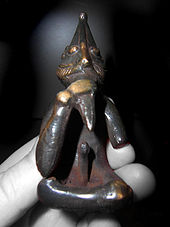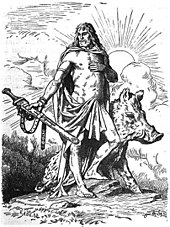Freyr
The Old Norse name form Freyr , partly modernized to Frey ( Old High German frô , older frôjo, frouwo , Gothic Frauja , Old English frēa ), comes from a common Germanic root * Fraujaz or * Frauwaz " Herr ", plus the feminine * Frawjō "Mistress". It is almost certainly the taboo designation of a god whose name itself was not used. Something similar can be found in biblical texts, where YHWH is replaced by adonai "Lord".


Freyr in the Ynglinga saga
Presumably Freyr is identical with Yngvi or Yngvi-Freyr, who appears for the first time in the Ynglinga saga as the ancestor of the Swedish kings and is mentioned in the eleventh chapter as the father of Fjölnir .
With Yngvi, the name of the Germanic tribe Ingwäonen and of course the gender name of the Ynglinger are connected . The composition Yngvi-Freyr could go back to an Old High German form Ingwia-fraujaz "Lord of the Ingaevones". For the southern Germans it is discussed whether the god " Fol " named in the Merseburg magic spells is identical to Freyr. A statue of Freyr was found in Rällinge (Sweden).
Freyr took over the kingdom of Njords . He built a large temple in Uppsala , founded his court there and established the wealth of Uppsala. He brought peace to the land and there were many good years the Svear attributed to Freyr's presence and leadership. Therefore, they worshiped him more than other gods, for the people had more wealth than ever before. His wife was Gerda Gymir-Datter and their son was Fjölnir. Freyr is also known under the name Yngve, his honorary name and his descendants were the Ynglinger. Ill as Freyr and infirmity few men were only allowed to see him getting worse. In the meantime a large hill had been built with a large door and three windows. This is where his dead body was laid out. Although Freyr was dead, the Svear were told he was alive. He and his treasures were guarded there for three years and during this time the peace lasted and the good years continued. His body was not given to the fire even after his death was known, as the Swedes believed that they would be blessed with prosperity and peace as long as Freyr (physically) stayed in their country. After Freyr, his son Fjölnir became ruler of the empire, as it is in the Ynglingatal , the list of the Swedish kings.
Freyr and Freyja
It is said that Freyr and Freyja were the children of Niörds (Njörðr) and the Skadhi , and this in turn was a daughter of the giant Thiassi . They are a pair of gods belonging together, as was the case with Dianus and Diana , Liber and Libera . In Sweden Freyr was worshiped as the main god and associated with the sun. Through his attributes he is also seen as the god of fertility and hunting. Freyja, on the other hand, is associated with the moon through her attributes and is also referred to as the goddess of love. Originally Freyja and Freyr were both siblings and spouses. It was only later that such a connection was found offensive, so that Óðr (Odhr) appear as Freyja's husband and Gerda as Freyr's wife. Odhr and Gerda are not mentioned in the early texts of Ögir's drinking binge.
Freyr was one of the Vans who were primarily fertility gods. He wooed the daughter of the giant Gymir from Jötunheim . Her son Fjölnir was to become one of the legendary kings of Sweden . After Æsir-Vanir War Freyr was as the Asen considered to belong and underwent them equal reverence.
Freyr had the dwarven ship Skidbladnir , in which all Aesir with armor could fit, and which always sailed wherever you wanted with the wind at your back. The dwarf Brokkr had forged the golden boar Gullinborsti ("the one with the golden bristles") for him . He is also called Slíðrugtanni ("the one with the dangerous tusks"). It pulls Freyr's wagon and runs through the air and across the water, lighting the night with its bristles.
The boar and horse are particularly sacred animals to the Freyr. The boar sacrifice for harvest blessings was probably offered to him in ancient times. Hence the boar as a symbolic animal of Swedish royal rule in earlier times. The special position of the horse in saga literature comes up late. When Olav Tryggvason destroyed Freyr's sanctuary, he rode the hallowed stallion and his men the consecrated mares. Here there was obviously the taboo that consecrated horses were not allowed to be ridden.
He ruled over rain and sunshine and, as the god of fertility, watched over growth. His cult center was Uppsala, where he was worshiped alongside Thor and Odin . Saxo writes that a sacrifice was made to him there annually by Haddingus and his descendants (Saxo I, 8, 12). According to Adam von Bremen, this only happened every 9 years, with people and animals being killed (Adam IV, 27).
Saxo Grammaticus writes that the Danish king of sagas Haddingus made an atonement for the god Frø (Saxo I, 8, 12). This is considered to be identical to Freyr. Adam von Bremen reports of a temple in Uppsala , which is dedicated to the fertility god Fricco (Adam IV, 24). Whether this was Freyr is uncertain and not particularly likely, since an etymological connection cannot be established. The Ynglingasaga further reports that the fróðafriðr ("Froði peace") led to sustained good harvests during the reign of the mythical King Frodi in Denmark. Therefore, Froði is mostly identified with Freyr in research. That would also be etymologically plausible, since froda means “ lushness , fertility” in Old Swedish . The depiction of Freyr with a huge phallus also matched it.
Freyr in the Skírnismál
Once Freyr sat on Odhin's throne ( Hlidskialf ), from which the sky god could see the entire world. When he turned his gaze to Jotunheim, he saw a beautiful maiden coming from the house of the giant Gymir. According to the Eddic poem Skírnismál , this beautiful woman was Gerda, daughter of Aurboda .
Freyr's servant, the Faithful Skirnir (cleaner), offered to take over the courtship. He therefore asked that Freyr should give him a horse and his sword. Equipped like this he went to Jötunheim and when Gerda asked him into the hall, he first tried to ensnare her with promises. He offered her eleven golden apples and then even Odhin's gold ring Draupnir , but she refused to be Frery's wife. He then threatened to cut off her head with his sword. When that didn't work either, he mentioned that he had a powerful spell that would make her a hideous creature that would age unmarried and lonely. Then she finally agreed. This crime led Freyr at Ragnarök to face the fire giant Surt without his sword and die.
literature
- Elof Hellquist: 3. Frö, ofta även Frey. In: Svensk etymologisk ordbok. CWK Gleerups förlag, Lund 1922, p. 161 (Swedish, runeberg.org ).
- Jacob Grimm: German Mythology . Dieterich, Göttingen 1834, p. 135 ff . ( books.google.de ).
- Wolf von Unwerth: Fiolnir . In: Axel Kock, et al. (Ed.): Arkiv för nordisk filologi (ANF) . New episode, volume 29 (= band 33 of the complete edition). CWK Gleerups förlag, Lund 1917, p. 320–335 (multilingual, runeberg.org - Zu Fiolnir [Fjölnir] as the son of Yngve-Freyr).
- Adam of Bremen: Gesta Hammaburgensis ecclesiae Pontificum. In: Sources of the 9th and 11th centuries on the history of the Hamburg Church and the Empire , Darmstadt 1978.
- Eyvind Fjeld Halvorsen: Freyr . In: Kulturhistorisk leksikon for nordisk middelalder , Vol. 4, Copenhagen 1959.
- EC Polomé: Freyr. In: Reallexikon der Germanischen Altertumskunde . Volume 9, Berlin 1995.
- Saxo Grammaticus: Historiae Danicae. Edited by Stephanus Johannes Stephanius , Sorø 1645, quoted from the Danish translation by Peter Zeeberg, Copenhagen 2000.
Web links
Individual evidence
- ^ EC Polomé: Freyr . In: Johannes Hoops (Ed.): Reallexikon der Germanischen Altertumskunde . 2., completely reworked. and strong exp. Edition. tape 9 : Fidel – peacelessness . Walter de Gruyter, Berlin / Boston, Mass 1995, ISBN 3-11-014642-8 , p. 587 ff . ( books.google.de - excerpt).
- ↑ a b Snorri Sturluson: Ynglinga saga . In: Snorre Sturlesons norske Kongers Sagaer . 1838, 12th cap. Freyrs Død to 14th Cap. Kong Fjölners Død (Norwegian, runeberg.org ).
- ↑ Wolfgang Golther: Freyr . In: Handbook of Germanic Mythology . Hirzel, Leipzig 1895, p. 218–242, here p. 225 ( Textarchiv - Internet Archive ).
- ↑ a b Ernst Siecke: Freyr, Freyja and Gerdha . In: The Love Story of Heaven . K. J. Trübner, 1892, p. 28–36 ( Textarchiv - Internet Archive ).
- ↑ Freyr . In: Meyers Großes Konversations-Lexikon . 6th edition. Volume 7, Bibliographisches Institut, Leipzig / Vienna 1907, p. 99 .
- ↑ Skirnir's ride. In: Literature in full text: The Edda. Stuttgart 1878, pp. 93-99 ( zeno.org ).
